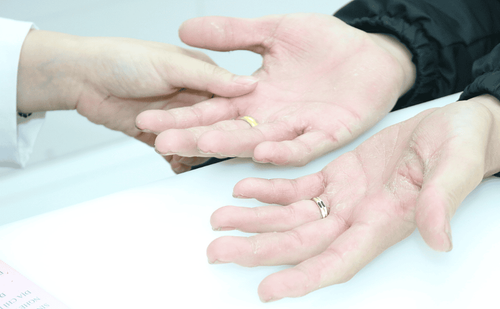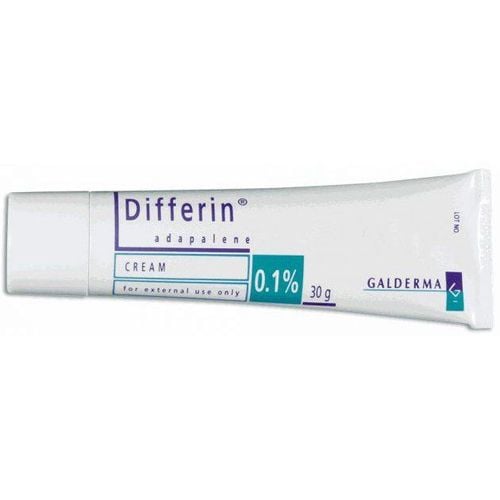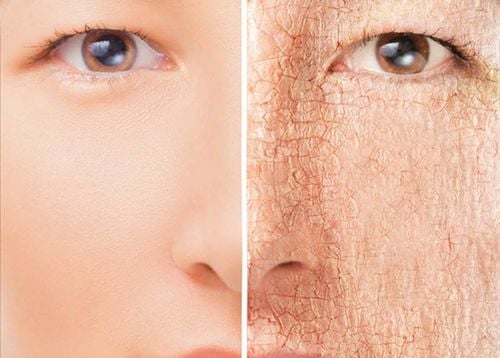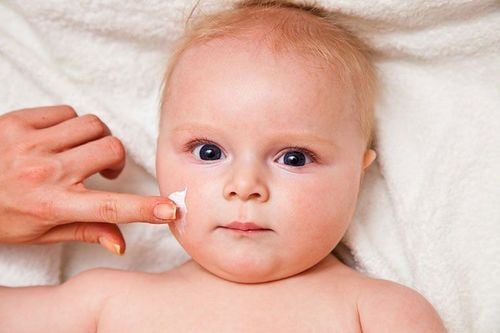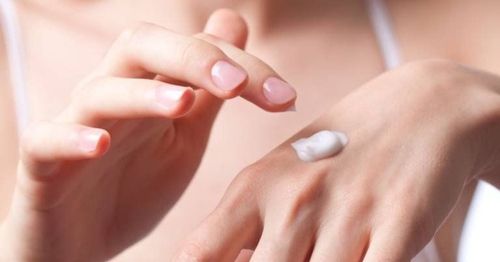This is an automatically translated article.
Dry skin is a very common skin condition that can affect anyone, and is more common in the elderly. In most cases, dry skin does not cause serious health problems but can lead to some dermatological complications and is difficult to treat.
1. What is dry skin like?
Dry skin is a skin condition characterized by lack of an appropriate amount of water in the epidermis of the skin. Although dry skin tends to affect both sexes and at any age, older people are more likely to experience dry skin. The skin in the elderly tends to have less natural oils and lubricants compared to younger people.
Dry skin appears more in areas such as arms, hands and especially feet. Environmental factors, such as humidity and temperature, have the most influence on the amount of water in the skin. Frequent hand washing also dehydrates and dries out the skin. Dry skin can also be a side effect of certain medications as well as a complication of certain skin conditions.
The epidermis is usually composed of fats (lipids) and proteins. The lipid part of the epidermis, together with its proteins, helps to prevent water loss in the skin. When the body lacks proteins and/or lipids, the skin's moisture levels become unstable and the skin becomes dry, it can also become more sensitive and prone to rashes and peeling.
Measures to prevent and treat dry skin are simple and effective. Basic dry skin prevention steps include avoiding the use of concentrated soaps and harsh detergents.
Treatments often require people with dry skin to regularly use mild emollients and moisturizers. If left untreated, dry skin can lead to complications, including atopic dermatitis, secondary bacterial infection, cellulitis, and skin discoloration. However, dry skin is usually mild and can be easily reversed.
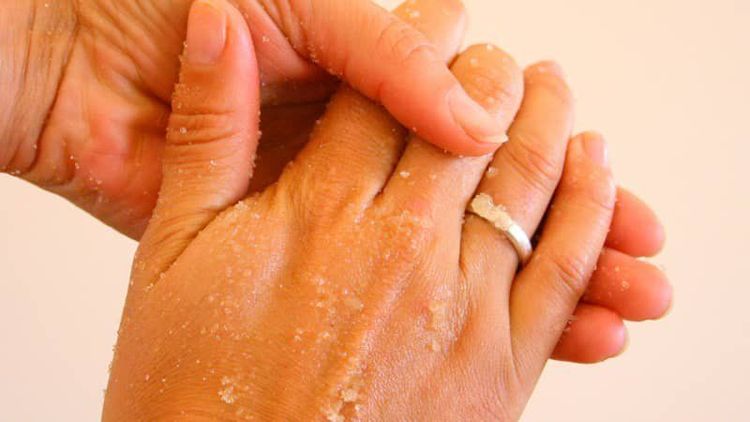
Da khô thường xuất hiện ở bàn tay
2. Dry, acne-prone skin
Does dry skin cause acne, or is dry skin the result of acne treatment? People with naturally dry skin may experience breakouts, and acne products can cause dryness and flaking. Most of us often see acne on oily skin, but when the skin is dry, acne will also appear on the skin. Although it can occur at any age, acne and dry skin are more commonly found in adults.
Dry skin causes the skin to produce more oil, which can lead to clogged pores and more breakouts. Dry skin can be hereditary or due to age, acne treatment products, or a combination of the two. Moisturizer is a key product in any skin care routine, but some moisturizers for dry skin can be irritating, or may contain ingredients that can clog pores. makes skin prone to acne. This is why special care is needed when choosing a moisturizer for acne-prone skin.
Dry skin and acne-prone skin are also associated with lower ceramide levels than normal skin. Ceramide is an active ingredient that plays a key role in the skin barrier, so a moisturizer with ceramide ingredients can also be beneficial for dry skin. Therefore, it is very important to find out what information is needed in a moisturizer when you are having problems with dry skin and acne.
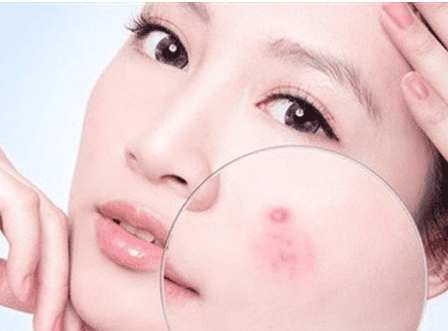
Da khô khiến da tiết ra nhiều dầu hơn gây ra tình trạng mụn
3. Dry cracked skin
Painful, cracked, rough skin, often on hands, face and especially lips, due to dry skin. Chapping is caused by a lack or reduction in the natural oils that help the skin fight the condition. Dry, chapped skin tends to occur in cold weather, when the oil glands secrete less oil, or after repeated bathing, washing, or wetting. Treatment of dry chapped skin is often recommended using a lanolin foundation.
4. Dry itchy skin
Dry skin itching is an uncomfortable feeling in the skin, creating the feeling of wanting to scratch. Also known as pruritus, itchy skin can be caused or made worse by dry skin. Itchy skin is common in older people, as the skin tends to become drier with age.
Itching in the skin can appear on certain areas, such as on the arms or legs, or on the whole body. Besides, itchy skin can occur without any other noticeable changes in the skin, or it can be accompanied by the following signs:
Red Bumps, spots or blisters Dry, cracked skin chapped or scaly skin Depending on the cause of the itchy skin, the skin may appear normal, red, or rough or bumpy. Repeated scratching can cause raised areas of thickened skin that may bleed or become infected.
Using self-care measures such as daily moisturizing, using a gentle cleanser and bathing with warm water will make it more comfortable. Long-term relief of symptoms requires identifying the cause and treating the cause of itchy skin. Common treatments for dry itchy skin are topical medications, moist dressings, and oral medications that relieve itching.
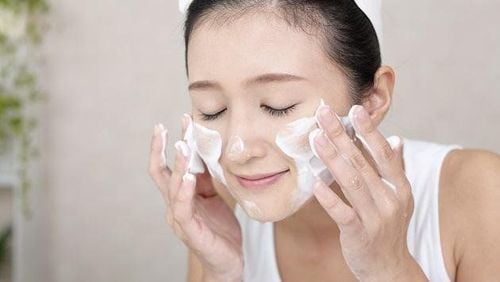
Sử dụng sữa rửa mặt nhẹ nhàng giúp cấp ẩm cho da khô
5. Dry skin lacks water
Dehydrated dry skin is a skin condition that occurs when there is a lack of water in the skin. This can happen to anyone, regardless of skin type, and people with dry skin are more susceptible to dehydration. Dehydrated skin often darkens and shows signs of premature aging, such as surface wrinkles and loss of elasticity.
A typical way to tell if your skin is dehydrated is the skin pinch test:
Pinch a small amount of skin on your cheek, belly, chest or back of your hand and hold for a few seconds. If it returns to normal, it is possible that dehydration is not present. If it takes a few minutes to return to normal, the skin may be dehydrated. In addition, with dry, dehydrated skin, you may notice some of the following signs:
Dark circles under the eyes Itching Dark skin Wrinkles
6. Dry skin
Dry skin is a condition of abnormally raised skin. The nodules can be hard or soft and move. Most cellulite is benign, not cancerous. Skin nodules are not usually dangerous and usually do not interfere with daily life. Possible causes of dry skin include:
Trauma Acne Moles Warts Pockets of infection, such as abscesses and boils Cysts, Allergic reactions, including hives Swollen lymph nodes Chicken pox
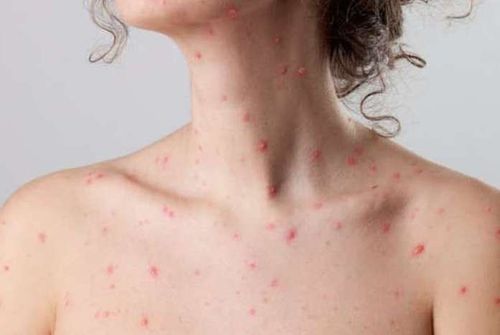
Thủy đậu có thể khiến da khô sần
7. Dry, itchy facial skin
An itchy face can be extremely uncomfortable and it seems that the cause of the condition is unknown. Common causes of dry, itchy facial skin include:
Cold weather Dry air Exposure to concentrated cleaning chemicals in soaps or other products Repeated facial washing Unbalanced facial pH Condition poor skin conditions, such as atopic dermatitis, seborrheic dermatitis, and psoriasis Diabetes, hypothyroidism, liver disease Smoking Excessive exposure to sunlight Various remedies for skin treatment itchy dry face. Choosing the best treatment depends on the cause of the dryness and the severity of the skin condition. Treatments also vary between different skin types, which can be normal, dry, oily or a combination.
You can do a lot on your own to improve your skin, including using a moisturizer and avoiding dry soaps. But sometimes dry skin happens frequently or is severe. In these cases, you need help from a skin specialist.
Clinical Dermatology Specialist Vinmec International General Hospital undertakes diagnosis, treatment, prevention and rehabilitation of diseases in the specialty of Leprosy and Dermatology. With a team of leading medical doctors, the system With a system of modern technological equipment, the hospital provides comprehensive and professional medical examination, consultation and treatment services; civilized, polite, safe and sterile medical examination and treatment space.
Please dial HOTLINE for more information or register for an appointment HERE. Download MyVinmec app to make appointments faster and to manage your bookings easily.
Reference source: mayoclinic.org; medicinenet.com; cerave.com; healthline.com




